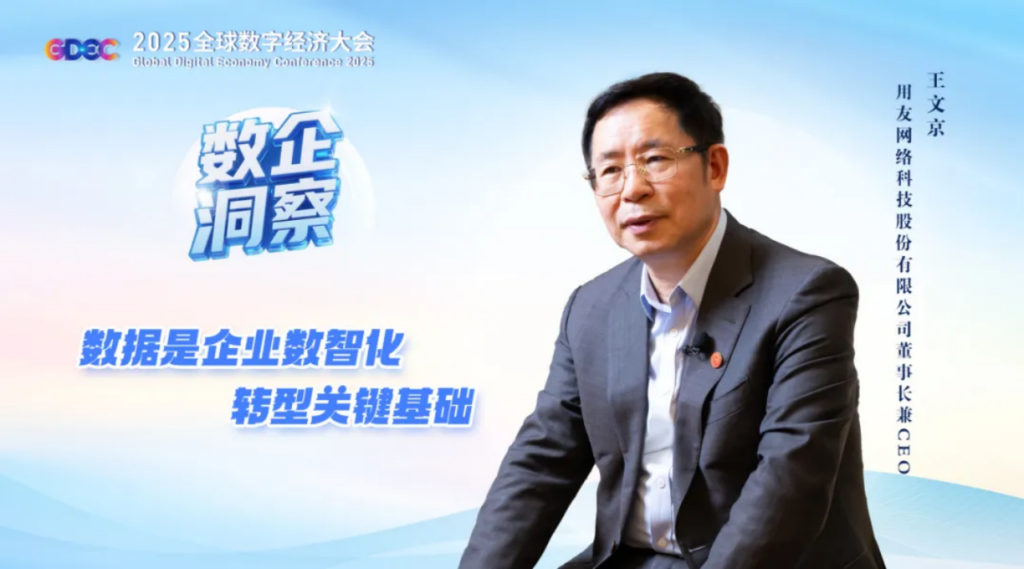Beijing, 2025 — The 2025 Global Digital Economy Conference was recently held in Beijing. During the event, Mr. Wang Wenjing, Chairman and CEO of Yonyou Network Technology Co., Ltd., sat down for an exclusive interview with Xinhuanet. He shared insights into the current stage of digital-intelligent (digital + AI) transformation in Chinese enterprises, the challenges they face, industry-specific differences, the value of data as a production factor, and how AI technology can be effectively integrated into enterprise operations. His comments offer valuable guidance for companies seeking to accelerate AI adoption and digital transformation.

Xinhuanet: The global digital economy is thriving, and many enterprises are embracing digital-intelligent transformation. In your view, what stage are Chinese enterprises currently at in this transformation?
Wang Wenjing: We see enterprise digital-intelligent transformation as progressing through three stages: business online, data-driven, and intelligent operations. At present, most companies in China are transitioning from the business online stage to the data-driven stage. Some leading enterprises have already advanced into the intelligent operations stage based on their data foundations.
Xinhuanet: What are the main challenges enterprises face in this transformation? How is Yonyou helping them overcome these challenges?
Wang Wenjing: In my view, there are three main challenges:
1. Aligning enterprise strategy with digital-intelligent transformation — transformation must support long-term business goals.
2. Establishing strong data governance — ensuring high data quality is a foundational requirement for success.
3. Adopting new-generation digital-intelligent software — companies must integrate strategy, data, and software systems to drive transformation holistically. Yonyou supports clients across all three aspects.
Xinhuanet: Digital-intelligent transformation varies greatly across industries due to differences in business models and operational characteristics. How does Yonyou address this?
Wang Wenjing: Transformation priorities differ by industry. In addition to core areas like finance, HR, and office automation—which are common across all enterprises—sector-specific needs vary:
• For manufacturing, the focus is on smart manufacturing and supply chain collaboration.
• For project-based service industries, it’s about project management.
• For consumer-facing service industries, the priority is customer operations.
Xinhuanet: Data is a core production factor in the digital economy. How do you view the role of data in boosting competitiveness? How should enterprises balance data usage and data security?
Wang Wenjing: Data is the fundamental resource for digital-intelligent transformation. Whether at the data-driven or intelligent operations stage, data plays a central role. To fully leverage data as a productive asset, enterprises must first digitize their business operations to accumulate large volumes of operational and management data. On that basis, they must prioritize data governance and standardization, which are key to generating value from data.
Xinhuanet: As AI becomes increasingly essential in enterprise transformation, how can it be deeply embedded into business processes and management systems to truly drive operational optimization and decision-making?
Wang Wenjing: AI is a major focus for today’s enterprises, particularly in how to apply it effectively. Based on Yonyou’s practical experience, I believe enterprises need to do three things to make AI work:
1. Integrate large language models (LLMs) and industry-specific vertical models;
2. Strengthen enterprise data and knowledge governance;
3. Adopt new-generation digital-intelligent software platforms.
Only by advancing on these three fronts can enterprises ensure that AI is successfully deployed and delivers real value.




